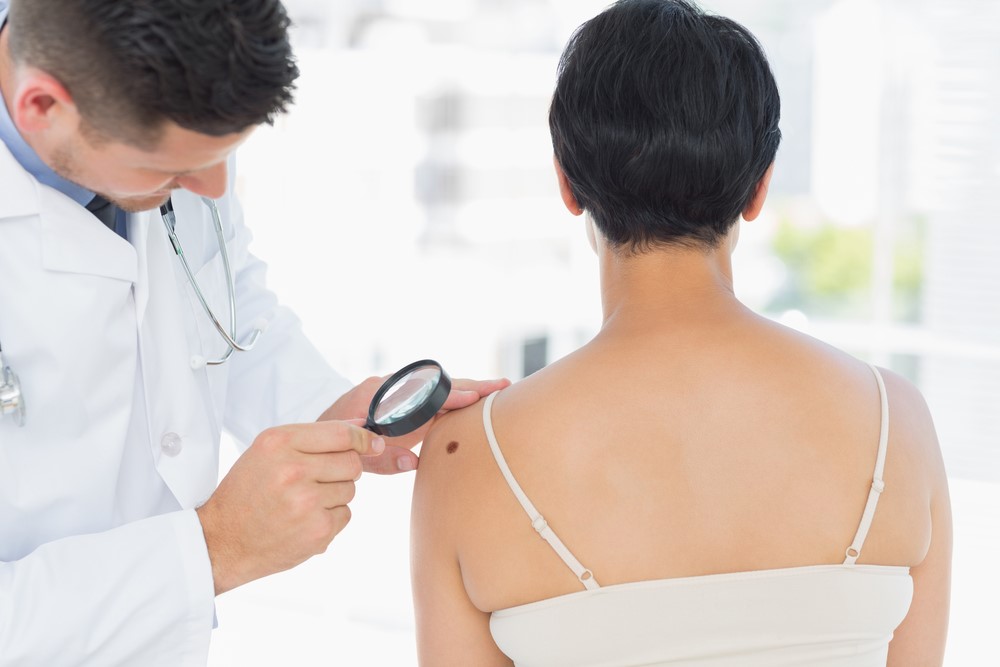Skin Cancer- Symptoms & Signs

Skin cancer is a type of cancer that originates in the skin. It mostly develops in areas of the skin that are exposed to harsh sun rays. Uncontrolled and abnormal growth of skin cells leads to skin cancer. These abnormal skin cells multiply rapidly and form malignant tumors. Of all the types of cancers known, skin cancer is one of the most dangerous ones. According to the Skin Cancer Foundation USA, the most common form of cancer is Skin Cancer. Almost half of all cancer cases reported in the States are a type of skin cancer. But having said that, it is also among those that are most preventable and treatable cancer. Skin cancer symptoms often include slow growth of bump on the skin that may bleed easily after a minor accident or trauma.
Let’s try to understand more about skin cancer, its types, sign and symptoms, causes, how to diagnose and prevent skin cancer for a timely treatment.
Types of Skin Cancers
There typically are three types of skin cancers that a human body can develop. These are as follows:-
- Basal Cell Carcinoma (BCC): This is developed in the cells lining the bottom of the skin (epidermis). These are usually slow growing tumors which rarely spread to other parts of the body. There are a number of different types of basal cell carcinoma which include the superficial types – the least dangerous variety and the most common one; and the morpheaform – the most challenging one to treat as the tumor in this case grows into the encompassing tissues without have a well-defined border line.
- Squamous Cell Carcinoma (SCC): This is developed in the cells lining the top of the skin (epidermis) and is most common amid immunosuppressed people. In majority of cases the biological nature of this cancer types is similar to that of basal cell carcinoma, with minimum chances of spreading to other body parts. However, there are some tumors that acts in an aggressive manner and can even metastasize and cause deaths.
- Melanoma: This is developed in melanocytes. Melanocytes are the cells that produce melanin pigment that colours the skin, hair and eyes. This is the most fatal form of skin cancer. If left undetected, it can spread to other organs, and hence is the most dangerous.
Now that we have established different causes and types of skin cancer, let’s try to understand skin cancer symptoms so as to detect it timely for corrective treatment.
Skin Cancer Symptoms
Basal Cell Carcinoma (BCC)
Prominent signs and symptoms of Basal Cell Carcinoma include:-
- Darkening of skin
- Loss of color
- Open sore that keeps on healing and re-opening
- A reddish patch or irritated area
- A bump/nodule on the skin with a shiny appearance
- A brown lesion that looks like scar
- A skin colored flat lesion
- Upon oozing, these cancers may begin to bleed.
It is relatively easy to treat BCC, if detected at an early stage. Though BCC seldom spread to other organs, it can result in major disfigurement and can even cause nerve or muscle injury.
Squamous Cell Carcinoma (SCC)
Prominent signs and symptoms of Squamous Cell Carcinoma include:-
- Rough, scaly or crusty patches, which might bleed
- New or unusual growth
- Changes in the size, colour or shape of any existing spot
- Raised lumps
- Wart-like growth
- Open sores
SCC usually occurs on sun-exposed areas of the body such as face, neck, ears, lips and backside of the hands. They can also develop in skin scars. If not detected and treated on time, SCC may develop into a large mass.
Melanoma
Prominent signs and symptoms of Melanoma include:-
- Irregularly shaped mole, with rough borders
- Change in the colour or texture of an existing mole
- Itching
- Redness around the site
- Ulceration
- Sores that don’t heal easily
Skin cancer symptoms usually do not show up until they have grown quite big in size. It is at this point when the skin start itching, bleeding or hurting. But typically one can notice skin cancer symptoms before they reach a higher stage.
Because skin cancers develop where they can be noticed, there is a good chance of catching the symptoms early. Keeping a regular tab on the skin for any unusual or new growth is extremely important. If you find anything peculiar or suspicious, visit Dr Lal PathLabs or avail special home testing and collection services for timely diagnosis.













